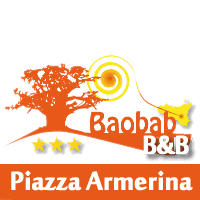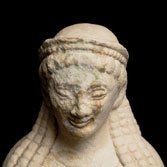Home - In and around
REGIONAL ARCHAEOLOGICAL MUSEUM OF CALTANISSETTA
Regional Archaeological Museum of Caltanissetta
It is situated at the corner between via Napoleone Colajanni and via Cavour, the street which takes you from the Central Station to the city centre. Address : Contrada Santo Spirito
The museum is housed in a building made in the 60s adjacent to a building dated back to the twenty year Fascist period, made for being the "House for the Italian Youth". Originally it was founded as Municipal Museum and since 1993 it has been administered by the Sicilian Region, which has annexed the adjacent building made in the 30s, to house the offices of the Archaeological Section of the Superintendency of Cultural and Environmental Assets.
The museum illustrates the history of the ancient sites of the urban and extra-urban territory of Caltanissetta and other towns within its province, from the prehistory up to the late ancient period. Among the most important sites we mention Dessueri, in the Mazzarino area, with the ruins of a settlement dated back to the early and final Bronze Age (11th-10th c. BC) and a necropolis, created by 3000 cave-shaped tombs dug into the mountain, second only to Pantalica (Siracusa) for importance and width; Polizzello, close to Mussomeli, with the ruins of the native village and necropolis (9th-7th c. BC); the local settlements of Gibil Gabib and Sabucina in the territory of Caltanissetta, situated on the hills controlling the Salso river (one of the main road for trade and military means in ancient times), which were hellenized by Gela and then dominated by Agrigento, which also hellenized the native site of Vassallaggi.
The collections.
The oldest core is constituted by a big number of items found by the Caltanissetta Archaelogical Association in the 60s, mainly in the sites of Pietrarossa, S. Giuliano, Palmintelli, Gibil Gabib, Vassallaggi, Sabucina.
Since 1996 also the archaelogical materials taken from the excavations made in other places within the province of Caltanissetta by the Superintendency in Agrigento and since 1992 by the Superintendency in Caltanissetta have been exhibited.
The museum is one of the most important in Sicily for its items which are very representative of the local civilizations. To be noted the bronze finds as well as the pottery from the settlements of Sabucina and Dessueri. And moreover, the items from the site of Polizzello, important for the study of the local civilizations during the Iron Age, whose artistic production was influenced by the Aegean-Mycenaean peoples migrated to the island in the 15th-14th c. BC.
The museum also exhibits some of the archaeological collection of Capodarso, a site in the province of Enna, but which is geographically and historically linked to this part of the land, as it controlled together with Sabucina, the valley of the Salso river (southern Imera).
The arrangement is both chronological and topographical and is divided in five big rooms, where plenty of explanatory material can be found.
Room 1
The urban territory of Caltanissetta (Pietrarossa, S. Giuliano, Santa Lucia, Palmintelli) and Gibil Gabib (settlements and necropoli) note the rich collection of decorated vases
Room 2
The local hellenized site of Vassallaggi (settlement and necropolis in the archaic and classic periods) note the metalwork (jewels and utensils) and Attic vases with red figures
Room 3
Sabucina from prehistory to Greek period (late Bronze Age hut settlements, settlement, sanctuary and Greek period necropolis)
Room 4
The sites of the southern territory of the province (from prehistory to imperial Roman period; settlements of Garrasia, Dessueri and Monte Bubbonia close to Mazzarino, Roman necropolis of Contrada Lannari, close to Sabucina)
Room 5
The sites of the northern settlement of the province, from Iron Age to late ancient times (Cozzo Scavo, close to Santa Caterina di Villermosa, Polizzello and Monte Raffe, close to Mussomeli, Mimiani, close to Caltanissetta) and Capodarso (in the province of Enna).
(Source: website of the regional cultural heritage )
It is situated at the corner between via Napoleone Colajanni and via Cavour, the street which takes you from the Central Station to the city centre. Address : Contrada Santo Spirito
The museum is housed in a building made in the 60s adjacent to a building dated back to the twenty year Fascist period, made for being the "House for the Italian Youth". Originally it was founded as Municipal Museum and since 1993 it has been administered by the Sicilian Region, which has annexed the adjacent building made in the 30s, to house the offices of the Archaeological Section of the Superintendency of Cultural and Environmental Assets.
The museum illustrates the history of the ancient sites of the urban and extra-urban territory of Caltanissetta and other towns within its province, from the prehistory up to the late ancient period. Among the most important sites we mention Dessueri, in the Mazzarino area, with the ruins of a settlement dated back to the early and final Bronze Age (11th-10th c. BC) and a necropolis, created by 3000 cave-shaped tombs dug into the mountain, second only to Pantalica (Siracusa) for importance and width; Polizzello, close to Mussomeli, with the ruins of the native village and necropolis (9th-7th c. BC); the local settlements of Gibil Gabib and Sabucina in the territory of Caltanissetta, situated on the hills controlling the Salso river (one of the main road for trade and military means in ancient times), which were hellenized by Gela and then dominated by Agrigento, which also hellenized the native site of Vassallaggi.
The collections.
The oldest core is constituted by a big number of items found by the Caltanissetta Archaelogical Association in the 60s, mainly in the sites of Pietrarossa, S. Giuliano, Palmintelli, Gibil Gabib, Vassallaggi, Sabucina.
Since 1996 also the archaelogical materials taken from the excavations made in other places within the province of Caltanissetta by the Superintendency in Agrigento and since 1992 by the Superintendency in Caltanissetta have been exhibited.
The museum is one of the most important in Sicily for its items which are very representative of the local civilizations. To be noted the bronze finds as well as the pottery from the settlements of Sabucina and Dessueri. And moreover, the items from the site of Polizzello, important for the study of the local civilizations during the Iron Age, whose artistic production was influenced by the Aegean-Mycenaean peoples migrated to the island in the 15th-14th c. BC.
The museum also exhibits some of the archaeological collection of Capodarso, a site in the province of Enna, but which is geographically and historically linked to this part of the land, as it controlled together with Sabucina, the valley of the Salso river (southern Imera).
The arrangement is both chronological and topographical and is divided in five big rooms, where plenty of explanatory material can be found.
Room 1
The urban territory of Caltanissetta (Pietrarossa, S. Giuliano, Santa Lucia, Palmintelli) and Gibil Gabib (settlements and necropoli) note the rich collection of decorated vases
Room 2
The local hellenized site of Vassallaggi (settlement and necropolis in the archaic and classic periods) note the metalwork (jewels and utensils) and Attic vases with red figures
Room 3
Sabucina from prehistory to Greek period (late Bronze Age hut settlements, settlement, sanctuary and Greek period necropolis)
Room 4
The sites of the southern territory of the province (from prehistory to imperial Roman period; settlements of Garrasia, Dessueri and Monte Bubbonia close to Mazzarino, Roman necropolis of Contrada Lannari, close to Sabucina)
Room 5
The sites of the northern settlement of the province, from Iron Age to late ancient times (Cozzo Scavo, close to Santa Caterina di Villermosa, Polizzello and Monte Raffe, close to Mussomeli, Mimiani, close to Caltanissetta) and Capodarso (in the province of Enna).
(Source: website of the regional cultural heritage )



